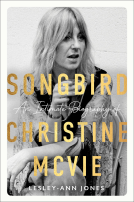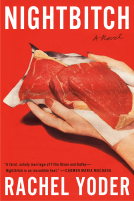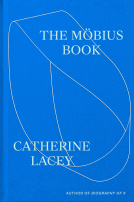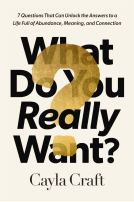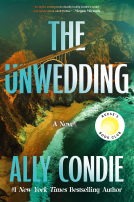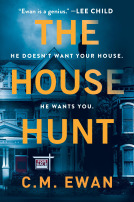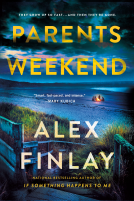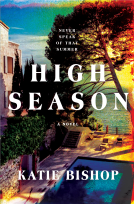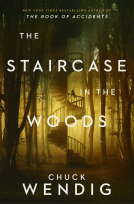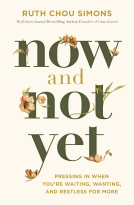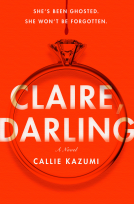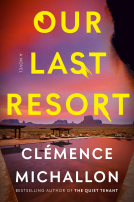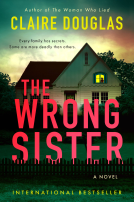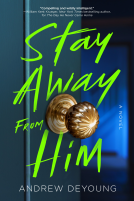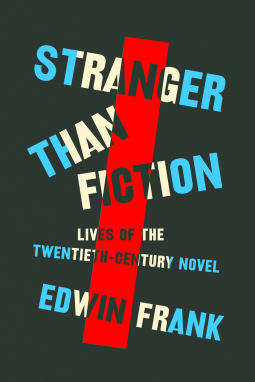
Stranger Than Fiction
Lives of the Twentieth-Century Novel
by Edwin Frank
This title was previously available on NetGalley and is now archived.
Send NetGalley books directly to your Kindle or Kindle app
1
To read on a Kindle or Kindle app, please add kindle@netgalley.com as an approved email address to receive files in your Amazon account. Click here for step-by-step instructions.
2
Also find your Kindle email address within your Amazon account, and enter it here.
Pub Date Nov 19 2024 | Archive Date Dec 19 2024
Description
One of the Washington Post’s 50 Best Nonfiction Books of 2024 | A New York Times Book Review Editors’ Choice | A Boston Globe Best Book of 2024
“Ambitious, intelligent, and happily unpretentious.” —Louis Menand, The New Yorker
“Convincing, idiosyncratic and often felicitous.” —Alexandra Jacobs, The New York Times Book Review
A legendary editor’s reckoning with the twentieth-century novel and the urgent messages it sends.
“How can we live differently?” a young woman urgently demands in Virginia Woolf’s novel The Years. It is the 1930s, war and death are in the air, but her question was asked again and again in the course of a century where things changed fast and changed all the time. The century brought world wars, revolutions, automobiles, movies, and the internet, votes for women, death camps. The century brought questions. Novelists in the twentieth century had a question of their own: how can we write a novel as startling and unforeseen as the world we live in? Again and again they did, transforming the novel as the century remade the world.
Imagine the history of the twentieth-century novel recounted with the urgency and intimacy of a novel. That’s what Edwin Frank, the legendary editor who has run the New York Review Books publishing imprint since its inception, does in Stranger Than Fiction. With penetrating insight and originality, Frank introduces us to books, some famous, some little-known, from the whole course of the century and from around the world. Starting with Dostoevsky’s Notes from Underground of 1864, Frank shows how its twitchy, self-undermining, and never-satisfied narrator established a voice that would echo through the coming century. He illuminates the political vision of H. G. Wells’s science fiction, Colette and Andre Gide’s subversions of traditional gender roles, and Gertrude Stein’s untethering of the American sentence. He describes the monumental ambition of books such as Mrs. Dalloway, The Magic Mountain, and The Man Without Qualities to rebuild a world of human possibility upon the ruins of World War I and explores how Japan’s Natsume Sōseki and Nigeria’s Chinua Achebe broke open European models to reflect their own, distinct histories and experience. Here too are Vasily Grossman, Anna Banti, and Elsa Morante reckoning in specific ways with the traumas of World War II, while later chapters range from Marguerite Yourcenar and V. S. Naipaul to Gabriel García Márquez and W. G. Sebald.
The story as a whole is one of fearless, often reckless exploration, as well as unfathomable desolation. Throughout, we discover the power of the novel to reinvent itself, to find a way for itself, to live differently. Stranger Than Fiction offers a new vision of the history and art of the novel and of a dark and dazzling time in whose light and shadow we still stand.
A Note From the Publisher
Advance Praise
"For lovers of the history of literature, there is no better book to pick up . . . In a time in which books and book culture are under threat, Frank’s literary history proves to be more than just a trip through our greatest works; it’s an urgent call for daring in our reading and writing." —Chicago Review of Books
"[Frank] distinguishes himself as an erudite tour guide . . . [He] sheds light on numerous thematic and aesthetic through lines, all presented in sinewy prose . . . This rewards and delights." —Publishers Weekly
★ "Borges believed that great readers were rarer even than great writers. On the strength of his first work of literary criticism, Frank, founder and editor of the remarkable New York Review Books imprint, is of that rare breed . . . Every chapter thrills to the telling detail, passionate engagement, and careful argument. This is eye-opening, delighted, close reading." —Booklist (starred review)
"Frank is a dogged enthusiast . . . [His] curiosity and scope are both admirable, and his prose style is consistently punchy." —Kirkus Reviews
"Accomplished and erudite—both comprehensive and tightly focused in its historical and literary exegesis." —John Maher, Publishers Weekly
"Edwin Frank tackles an ambitious project that's ideally suited to his service as the longtime editorial director of New York Review Books and founder of the NYRB Classics series . . . A well-informed and lively survey of the novel's dramatic transformation in the 20th century." —Harvey Freedenberg, Shelf Awareness
“An indispensable book for young writers who want to know where to go from here, for older writers who want to understand just what it was they did and why, and for any reader looking to deepen appreciation of the novel as an art form. Edwin Frank has a brilliant and original mind, and Stranger Than Fiction is the culmination of a lifetime’s worth of reading and thinking at the highest level.” —Jeffrey Eugenides, author of Middlesex and The Marriage Plot
“Living as we do in a world where book culture is on the decline, Stranger Than Fiction comes as a comfort, a solace, and a revelation: a wealth of remarkable writing about even more remarkable writing.” —Vivian Gornick, author of The Odd Woman and the City and Unfinished Business
"Edwin Frank’s masterly account of the novel gone modern and the modern gone global is a critical history of the last literary century. Emphasis on critical, emphasis on last. It’s also a sub rosa memoir of a life lived through reading and a stealth polemic that elevates self-made taste above the conformity canons. Epic, personal, smart, wise, witty, with a heart going like mad and yes I said yes I will Yes." —Joshua Cohen, Pulitzer Prize–winning author of The Netanyahus
"Writing a book about the twentieth-century novel is, to quote Edwin Frank, to attempt to ‘measure the immeasurable,’ a task that Frank measures up to with brilliance. He is as shrewd and perspicacious about the worlds novelists create as he is about the worlds and milieus they live in and grapple with. Page by page, the book is a critical education at its most absorbing." —Amit Chaudhuri, author of Sojourn and Finding the Raga
"At once erudite and entertaining, Edwin Frank’s Stranger Than Fiction is a pleasure and an inspiration, a call to read or reread the novels—the masterpieces—he discusses and to see them through the lens provided by his fascinating biographical information and brilliant literary insights." —Francine Prose, author of The Vixen
"As an editor, Edwin Frank has reinvented our ideas of the history of twentieth-century literature—patiently filling in gaps and upending values. As a critic, he now offers a gorgeously detailed version of the same disorientation. Stranger Than Fiction is a kind of portable library, a highspeed and dazzling tour of what the twentieth century made of fiction, and what fiction made of the twentieth century." —Adam Thirlwell, author of The Future Future
"This gallery of portraits—or collective biography—of the life and times of the 20th century novel recovers the lost pleasures of literary criticism: interesting on every page, enamored with the books as themselves, jargon-free, and full of things one doesn’t know and observations one has never made." —Eliot Weinberger, author of The Life of Tu Fu and Angels & Saints
"With characteristic originality and verve, Edwin Frank begins this brilliant tour d’horizon with Dostoevsky and the jagged, self-lacerating voice of the Underground Man; he then listens in to the broken music of modern humanity as reverberating in fiction from big masterworks to lesser-known books. By turns generous and acerbic, meditative and aphoristic, Frank juxtaposes writers with startling flair (Colette and Kipling; Nabokov and Carpentier) revealing an ever-deeper loss of bearings until he closes with the melancholy, haunted meanderings of W. G. Sebald. The frequencies that novels have registered are filled with rage and desolation, yet the overall effect of this close and passionate reckoning is exhilarating and transformative. If reading is an art that risks being lost, then Stranger Than Fiction reminds us of its indispensability—to knowing ourselves and what brought us to where we are." —Marina Warner, author of Esmond and Ilia: An Unreliable Memoir
“In his visionary career as an editor, Edwin Frank has published works of special brilliance: each one adds to the sense of what’s possible on the page. As one reads his illuminating Stranger Than Fiction, one follows the many paths of the twentieth-century novel in the company of Frank’s own prodigious reading, his intimate understanding of writers’ lives and discoveries, and his deep insight into the varieties of experience a novel can create; the form itself emerges with fresh splendor and sends us back to the books anew.” —Rachel Cohen, author of Austen Years
Available Editions
| EDITION | Other Format |
| ISBN | 9780374270964 |
| PRICE | $33.00 (USD) |
| PAGES | 480 |
Available on NetGalley
Featured Reviews
 Reviewer 499835
Reviewer 499835
I'm so grateful to Edwin Frank for writing this book. And I'm grateful to Alex Ross, in a way, too, for writing his book about 20th century music--a book I also loved--and that Frank cites in the opening pages of Stranger than Fiction as giving him the template he needed to write his book about 20th century fiction. This book isn't a stab at creating a canon; it isn't prescriptive; it isn't trying to build a theory of literature. It isn't even a history, per se, although it covers a certain time period in a sometime-chronological manner. What it is: Amazing. Never condescending, never pandering. It's like a conversation with the friend I always wanted to know, the one who loves language as much as I do and who has thought a great deal more than I have, though, about how literary language works. I've only read about 1/3 of the books discussed here by Frank (maybe another 1/3 are in my bookshelves, aspirationally acquired, and waiting for me to pick them up one day), but it didn't matter that I hadn't read every book Frank wants to tell me more about, because everything he wrote about every book made me understand better why literature is meaningful, and how writers learn from one another, and how their works relate to and enrich one another. I loved the erudition. This book exhilarated me.
Frank's work isn't an attempt to establish a definitive canon or prescribe literary theory. It defies categorization as a straightforward history, yet its insightful exploration of 20th century fiction unfolds in a captivating, non-condescending manner, akin to a cherished conversation with an intellectually stimulating friend who shares my passion for language and has delved far deeper into understanding literary nuances. While I've only read a fraction of the books discussed by Frank—others await my attention on my shelves—the joy and enlightenment his writing brings transcend familiarity with each text. His erudition and enthusiasm for literature left me exhilarated and enriched, illuminating how writers influence and inspire one another, and why their works resonate so profoundly.
